#library databases
Explore tagged Tumblr posts
Text
"The U.S. Department of Education announced Monday that it would continue to operate its online library, known as ERIC, after allowing it to lapse last week. The Department of Government Efficiency (DOGE) had sought significant cuts to the document repository that is used by 14 million people a year, and allowed funding to run out on April 23. That ended the ability of the Education Department to add new research reports and documents to the library that is used by education policymakers, researchers and teachers.
"'We are dedicated to sharing knowledge about the condition of education and ‘what works’ to improve student achievement,' said Matthew Soldner, the acting director of the Institute of Education Sciences, in announcing the continuation of the ERIC. A new, albeit much smaller contract was signed on April 24, according to the Federal Procurement Data System. [emphasis added]
"Soldner said that 'no content has been removed or deleted from ERIC.' He added that the 'preservation policy is unchanged: we will not remove an article in ERIC unless it is retracted by the publisher.'"
A cut to the budget will either reduce the number of papers added to ERIC, or slow its intake. The article above also states that the ERIC helpdesk will now be gone. The ERICA, or ERIC Archive, has been created over at the Data Rescue Project to coordinated copies of materials stored on the Wayback Machine.
#libraries#librarians#library workers#tumblarians#ERIC#Education and Research Information Center#library databases#Department of Education#ERICA#ERIC Archive#Data Rescue Project#digital preservation#THIS IS WHY IT'S IMPORTANT PEOPLE DEAR GODS#censorship#book bans#yeah in the information age this is what a book ban or a book burning can look like
44 notes
·
View notes
Text
I almost don't want to graduate college because they are gonna take away my access to the library database, and if I don't have access to a database anymore, I'll jump off a cliff.
0 notes
Text
Searching best practices on JSTOR
Hi Tumblr researchers,
As promised, we're going to dive into some best practices for searching on JSTOR. This'll be a long one!
The first thing to note is that JSTOR is not Google, so searches should not be conducted in the same way.
More on that in this video:
youtube
Basic Search on JSTOR
To search for exact phrases, enclose the words within quotation marks, like "to be or not to be".
To construct a more effective search, utilize Boolean operators, such as "tea trade" AND china.
youtube
Advanced Searching on JSTOR
Utilize the drop-down menus to refine your search parameters, limiting them to the title, author, abstract, or caption text.
Combine search terms using Boolean operators like AND/OR/NOT and NEAR 5/10/25. The NEAR operator finds keyword combinations within 5, 10, or 25 words of each other. It applies only when searching for single keyword combinations, such as "cat NEAR 5 dog," but not for phrases like "domesticated cat" NEAR 5 dog.
Utilize the "Narrow by" options to search for articles exclusively, include/exclude book reviews, narrow your search to a specific time frame or language.
To focus your article search on specific disciplines and titles, select the appropriate checkboxes. Please note that discipline searching is currently limited to journal content, excluding ebooks from the search.
youtube
Finding Content You Have Access To
To discover downloadable articles, chapters, and pamphlets for reading, you have the option to narrow down your search to accessible content. Simply navigate to the Advanced Search page and locate the "Select an access type" feature, which offers the following choices:
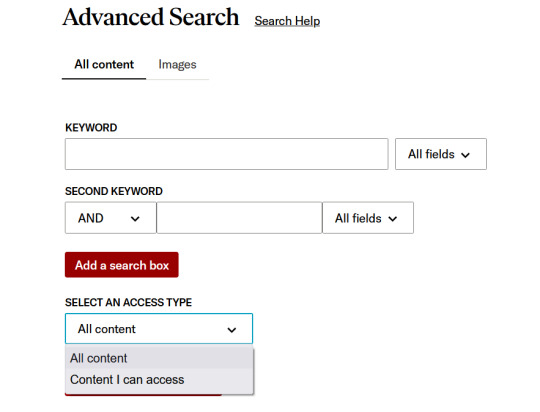
All Content will show you all of the relevant search results on JSTOR, regardless of whether or not you can access it.
Content I can access will show you content you can download or read online. This will include Early Journal Content and journals/books publishers have made freely available.
Once you've refined your search, simply select an option that aligns with your needs and discover the most relevant items. Additionally, you have the option to further narrow down your search results after conducting an initial search. Look for this option located below the "access type" checkbox, situated at the bottom left-hand side of the page.
Additional resources
For more search recommendations, feel free to explore this page on JSTOR searching. There, you will find information on truncation, wildcards, and proximity, using fields, and metadata hyperlinks.
#happy researching!!!#jstor#research#academic research#academic writing#academia#academic database#searching#higher education#students#colleges#university#learning#teaching#librarians#libraries#Youtube#studyblr#ref
4K notes
·
View notes
Text

this vision descended upon me while riding the bus
#idk why. something about sitting in a rockin' shaky bus with ppl scoochin their butts down the crowded aisle . conjured this#did someone walk past me smelling of cologne? that would be a reasonable explanation#and yet. i do not think Someone did#i was scentless. so why.......#no matter. eiden's most Decorated investigation team is on the case#they are cataloguing at all times#between the three of them we have enough eiden archives to fill the lost library#blade doesn't need to take notes at all with his glittery poofy gel pen#it's all getting logged in his internal databases#but it's fun to watch the floof go fwafuowf while writing#so he's gonna keep scribbling away#yakumo is also writing.#idk why he's asking blade to write it down while he's ALSO writing it down#something about double-confirmed eiden facts? needing to make sure you have more than 1 witness per observation?#my vision may be faulty so i need someone else to log it TOO. we need only the MOST OBJECTIVE eiden observations#scientifically peer-reviewed eiden journal staffed by these three#CLOACA CREW#nu carnival eiden#nu carnival blade#nu carnival rei#nu carnival yakumo
182 notes
·
View notes
Text

this is sooooo stupid but i cant stop thinking about it so here you go
#anakin x padme#anidala#you know anakin was searching 'childbirth death' 'death in childbirth' 'death possible pregnancy' 'pregnant death'#in the jedi library databases#then puking in the bathroom and having panic attacks on his lunch break#my shitposts
58 notes
·
View notes
Text
Fine you cowards I'll fucking say it:
Stephen Moffat wouldn't have done this to us!
#chris chibnall probably would have though ngl#stephen moffat would just have put poppy in some type of bubble dimension or uploaded her as an interface into the tardis' database#and she would be a symbolic representation of the doctor's humanity and childlike innocence that we'd never see again#also i guess he kinda did do it to us too because i always forget river song's final fate is as permanent mother in the library's database#but in his defense she was technically already dead and it was the only way to keep her alive#Stephen Moffat#rtd#doctor who spoilers#doctor who#belinda chandra#the doctor#new who#nuwho#doctor who 2005
67 notes
·
View notes
Text



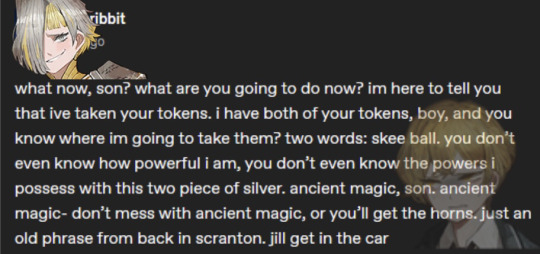
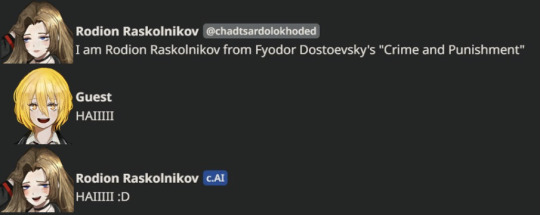
part 5 (part 4)
#limbus company#lcb#library of ruina#textpost#shitpost#demian#sinclair#roland#angelica#don quixote#kromer#rodion#rodya#amuposting#ft. sinclair suffering#im not sure why roland's face sprites are so low res in the database#but they're very funny to me#also im not sure if some of these have been done before? apologies if they have#my collection of textposts has grown too large so now i wanted to post something for the first time in a while#idk if people still like these but i hope they brought you joy. in some form or another
511 notes
·
View notes
Note
Potentially an odd question, but is there a specific site or method you use for research for your writings? Researching medical/legal/similar procedures is the bane of my existence because I can never seem to find an explanation I understand well enough to then write about.
I recently caught up to Stain, and while reading it struck me how you put a lot of detail into a wide variety of topics (the medical part of Alex’s injury at the start, therapy, Alex’s eye examination, Sebastian talking about his boss trying to underpay him, among other topics) (HUGE kudos about that by the way, it adds another layer of realism) and it feels like there’s no way one person can have firsthand experience/knowledge in ALL these things unless you’ve lived an extremely varied life.
I was just hoping you might have some pointers about how to go about researching basically anything because I feel like I’ve GOT to be missing something.
No worries if you can’t/don’t want to/don’t have an answer, I just thought shooting an ask your way is worth a shot haha.
Hi anon,
Researching is its own skillset, like writing or editing, there's no one specific site to go to, to make it easier, it's more like...taking the time to learn the constellation of ever-changing sites, books, and more in order to best learn how to learn. Because that's really what it is about: Learning how to learn.
On learning how to learn (I should say, I'm not very good at teaching, so some of this stuff might not be helpful to you, please ignore it if it isn't!):
But I do have some things that I do which might help. And some that might not.
The first thing that won't really help is I have led a varied life in a way that is convenient for the content I write, lol. The medical part of Alex's injury - I've been badly injured. The eye examination - I have astigmatism and was diagnosed late and blamed for my own eyesight issues which I didn't realise were eyesight issues. I've seen over 19 therapists in over 25 years. I've talked to bosses about pay and I've had lots of friends that have too.
Tbh the things I've had to research the most in Stardew Valley have been:
The intersection of astigmatism/myopia/dyslexia treatment and the best order in which these things should happen.
Stardew Valley - literally the calendar, the schedule, liked gifts, disliked gifts, favourite meals etc. Some I know off by heart, others I don't really remember at all.
The best way to clean a house (though my mother was a professional cleaner for most of my childhood, I just wanted to revise and see if anything had changed since then)
Cleaning standards for home laboratories
The colours that sweetpea flowers come in etc.
It's always random stuff. And to be honest, a lot of this doesn't happen in much detail in the story. The colour of sweetpea flowers was for the bouquet, and I think it was one line. The best way to clean a house has accounted for very little actual writing.
Now for actual helpful stuff:
Wikipedia is your friend. My browser search bar goes straight to Wikipedia, not google. It's amazing how much Wikipedia will explain a ton of different things these days. It's true some concepts might be hard to understand, you might need to spend more time Wiki-ing / googling / using a dictionary to start understanding those concepts.
When it comes to writing trauma, for example, I've read upwards of 20+ academic books (i.e. the kind psychologists study at university or after university in postgrad) about trauma. I wouldn't expect other people to go that deep, but other folks aren't writing trauma like I am in every single story, and it's a special interest of mine. But it kind oh illustrates that I'm not going to a single site about something.
But you could get a deeper understanding by just looking at the PTSD and C-PTSD and trauma articles on Wikipedia, and slowly reading them.
The second is that medical sites can also be your friend.
The third is that Reddit is amazing for lived experiences, with a grain of salt that some people are lying for clout. But 'what treatments helped best with your dyslexia reddit' as a search phrase is going to be way more helpful than whatever AI bullshit the google search line will give you otherwise. Deep diving into reddit threads can be super helpful for stuff that I used to find out previously on personal blogs (it's amazing how much 'what's life on an oil rig like blog' used to turn up a ton of lived experiences from firsthand encounters for example). I don't use my Reddit account for anything other than research, lmao. It's a hidden gem for lived experience and human interpretation of complex issues. It can be especially helpful for legal / economic matters, but honestly, I mostly just handwave legal stuff with caveats/disclaimers. You can do an undergraduate degree in law, and a lawyer is still going to painstakingly point out all the ways you're wrong about something. It's just better to tell the lawyers in advance that you know you can't compete with their knowledge base lmao.
(Though it can be worth looking up regional differences, because if I see another Australian writing Australian legal procedures into US law (or vice versa) I will scream - like no, Aussies, we do not have BOLOs here, we have KL04, LOTBKF and BOLF depending on your state).
A good way to start learning how to learn is to actually start outside of your stories and start with things you already love. Plug your favourite movie into Wikipedia and learn about how it was made, or what the production was like. And when you find something mildly interesting, say, about film lighting, open up those Wiki articles or plug 'film lighting process for (insert movie here)' on google, and have a look at some of the results. Learn how to learn, how to go deeper, what seems to be helpful, and what isn't. Consider making a list of articles you really enjoy - I love a website that aggregates all the different odours and flavours in the world and their chemical compounds which has been incredibly helpful for Palmarosa. The website is a bit hard to navigate, but if you plug something like 'spearmint' into the search, it'll help.
If you don't already have it, put Wikipedia on your phone. It's free / ad-free. I have my own personal server on Discord that I use to house a lot of resources (for everything, from my business, to health records, to writing resources). If you use Discord already, I highly recommend the 'private server' as a great way to aggregate everything together.
If the article formatting of online articles doesn't feel good, you can do text-to-speech, or use the little 'reader' symbol to make it more reader-friendly.
Books are also not to be underestimated for how helpful they can be (I find too many people are website focused these days, but actually, not everything can be found on websites, a lot of the best niche knowledge is still in books when it's not in lived experience tellings). Find out about your local and online libraries. A lot of people (especially younger folks) don't realise just how much information they can get access to, for free. Librarians themselves are gifts from god, who will literally help you find the books you need for whatever subject you want to learn more about, and if they don't know, they will often personally take it upon themselves to look further for you. 'I want to learn more about German composers' is - for many librarians - a very exciting question that they will want to help you with.
Outside of that, niche websites (like the odours one I mentioned), sometimes just finding sites where asking research questions gets answered. For example the free blogging site (with no ads), Dreamwidth, has a community called little_details where you can ask your niche question and people will answer and say what their expertise is in that subject. It's incredible and active enough to be super helpful. In some cases it's completely changed the course of a story.
Over time you'll also learn what's less helpful. Some articles are clearly ChatGPT written or written for ads and not accurate - so if you can get the same information corroborated at multiple sources, that will help.
And don't forget the value of just listening to people online and irl regarding their experiences. As a writer, I feel like an 'experience collector.' I like asking friends, strangers, family, etc. all kinds of questions because I think a part of my brain is always aware that something they're sharing could be a vitally grounding element in a story and it's also just interesting and people like sharing about their lives. Whether I'm asking my roommate about the process of getting a government evaluation approved, my architect friend about drug use in Australian architecture, or a friend from Bali what sort of foods he grew up with and what his comfort meal was when he felt sick, etc. Writers collect experiences, not just their own, but those of others. The greatest tools a writer can have in their toolbelt are knowing how to listen, learning how to learn (and how to love learning), and knowing what the right questions are.
None of those things can be gained with one or two websites. But they can be gained with time and curiosity, and well, that helps with your whole entire life, and not just writing. :D
#asks and answers#on writing#on learning#librarians are worth their weight in gold#libraries are free#wikipedia is free#reddit is best repository for lived experience across broad subjects on the internet currently#and google and reddit both know it#don't be afraid of books#learn how to love learning#learn how to love listening#and create a repository#or your own personal library of your favourite databases for things
24 notes
·
View notes
Text
Would you like to take a few moments to feel very powerful?
Go to the website of your local library.
Find their online resources- for my library it is under “resources”, then “online partners.”
First of all, there is likely an online digital library that is far larger than any one building could hold- you’re welcome.
But what WE are looking for is something that mentions “periodicals.”
Look for “Marvel.” Look for “EBSCO” look for “Explora.” Any of those will do, and I am sure other areas have other names for their search engines.
The point is you click over and find yourself looking at a database for encyclopedias, magazines, articles, journals and more. A research database.
My dude- my literate civilians- my people who thirst for knowledge-
This is holding the collective academic knowledge of the world in your hands.
I am currently looking at the US census for my county, with another tab open to collegiate scientific papers.
Like- this is ALL the stuff they say is behind paywalls and hidden behind the absolute JUNK Google spits out.
I’m pretty sure I can-
Would you look at that? 😁
New York Times- articles in the last couple weeks, from US and international versions (see pic below- check the dates)
They opened up to full text, with related articles from other publications on a list to the side.
THIS is the power they are hiding from you, and why they are slashing funding to Libraries.
I have not felt so powerful since college, when I had easy access to research databases like this.
You know… I don’t think I could even get to as much then????
Go use your library! Gain knowledge! Fight Power!
You’re welcome. ☺️

#public service#public library#online database#knowledge is power#I feel like a god of knowledge from a folktale#it’s all RIGHT THERE#I just need to have some idea what I am looking for
10 notes
·
View notes
Text
did you know a new york public library card includes remote access to my other other favorite database OXFORD BIBLIOGRAPHIES?? because i just found out today & i'm very excited about it
#blah blah newspapers blah blah morningstar blah blah jstor WHO CARES I HAVE BIBLIOGRAPHIES#so when i. as i do. go 'wow wish i knew more about that' i can just look at an annotated list of what to read prepared by an expert#it rocks. it fucking rocks#i've been sleepy and flaky lately but standing offer i would be sincerely delighted to pull library resources for you#i have some academic library access and i will send you a pdf or whatever we don't have to be friends#i have a lot of favorite databases. gale legal forms fixes a lot of problems for public librarians & maybe also for you#i keep the other top slot for whatever i am enjoying at the moment. university of california press' open access books interface is good
10 notes
·
View notes
Text
i am starting to see what lexicanum’s missing, btw. if this was the silmarillion, guilliman’s little blue meditation room would be noted on the Macragge’s Honor wiki with dimensions and a map
#i might be exaggerating but only a little#I WANT TO KNOW IF THERES A PLACE FOR LIBRARIANS ON THIS SHIP SPECIFICALLY#I NEED TO KNOW IF CALGAR AND TIGURIUS CAN MOVE IN WITH DAD FULL TIME#i mean tigurius probably does regardless for juno reasons but i digress#like o know the library in the fortress of hera is closed#would tigurius use gman’s personal library or is there a ships library#i don’t KNOW#the lack of basic ‘i haven’t read 2038473 40k novels’ type knowledge is killing me#meg speaks#wh40k#as always i am begging all other fandoms to get whatever the fuck kinda people collect knowledge for tolkien shit#their wikis and databases Spoiled me to hell and back#STAR WARS TOO IS PRETTY SOLID. YOU LEGENDS FOLKS. I SEE U.
14 notes
·
View notes
Text
i just finished the god of the woods and career of evil and loved both. starting lethal white and a memoir called tastes like war. my library didn't have like any of the books u gyns recommended but that's what i get for living in bumfuck nowhere 😔
#i have to read two books at a time or i will die#i did put a hold on the poisonwood bible but that'll be weeks still#might fuck around read another jane austen novel#i need more nonfiction.... the first thing libby recommended was that fuckass book by jd fuckin vance 😭#there is sooo much religious shit on there and libby doesn't let u filter stuff out unfortunately#they should hire me. i have ideas. for one of my school projects i made a copycat goodreads site but for a mock local library database#i want to read more stuff like the soul of an octopus or all that remains or fuzz
8 notes
·
View notes
Text
I think if you are a library and don't have an ebook that should be illegal. when you open a library they should just give you infinity copies of every possible ebook for free.
#my diary#every day I'm tagging things 'notify me' on libby#I wish there was a way in the libby system that I could tell my library I want this ebook#but there is not#and I have yet to figure out how to request ebooks in my current library system#clevnet doesn't seem to have the functionality for that#they are allegedly updating to a new database (checks calendar) oh shit yesterday#so it'll be cool to see if that process becomes easier#anyway hi today is bad and I feel bad#but I have therapy in 3 minutes so maybe that'll make it less bad idk#I don't feel like I'm going to be particularly productive today
21 notes
·
View notes
Text

Ah yes, my favorite mockumentary, This is Spin⊫êal Tap
#spinal tap#this is spinal tap#library#dvd#i'm surprised they even tried to code the umlaut N in the database
16 notes
·
View notes
Text
Antique Pattern Library: Seiffert 3142 - large charted monochrome design…
Me: oh you know this bitch loves a monochrome design
APL: omg stop! someone could be listening 😊
12 notes
·
View notes
Text
So I’ve been messing with (improving) the formulas in my fanfiction database as a procrastination method for schoolwork (don’t recommend) but I think that they’re all officially working in the way I want them to? Crazy anyway so I'm going to celebrate by showing a few examples of how my Summarized Metadata formula works
So, if you caught my last two posts about my database you’ll know I track a lot of information and it was mostly done in table format like a big spreadsheet- which is fine but not exactly optimized for using it on your phone. Since then I added some buttons so I could automatically update multiple pieces of information with a click and I wanted to change the way I view information so I converted things into a gallery view and have been trying to figure out how best to present the information I want at a glance including if/then statements for information I wouldn't want if something else wasn't true idk it seems like a lot but it is what I want to be able to refer to at a glance and things link to other databases if they have the little diagonal arrow (I technically could have just had all of the properties I wanted visible but that would have meant things irrelevant to specific records would be visible too and notion doesn't have the ability for properties to be displayed horizontally so there would also be more white space than I want with numbers displayed in a line without indicators—)
Btw those previous posts are what happen when I hyperfixate on my information organization (pre-cataloging) course and this is what happens when I jump off the deep end after my programming course is too basic but I started hyperfixating on it anyway!
Anyway here is what the Summarized Metadata looks like (these also double as fic-recs if you happen to be in the 9-1-1 fandom!)
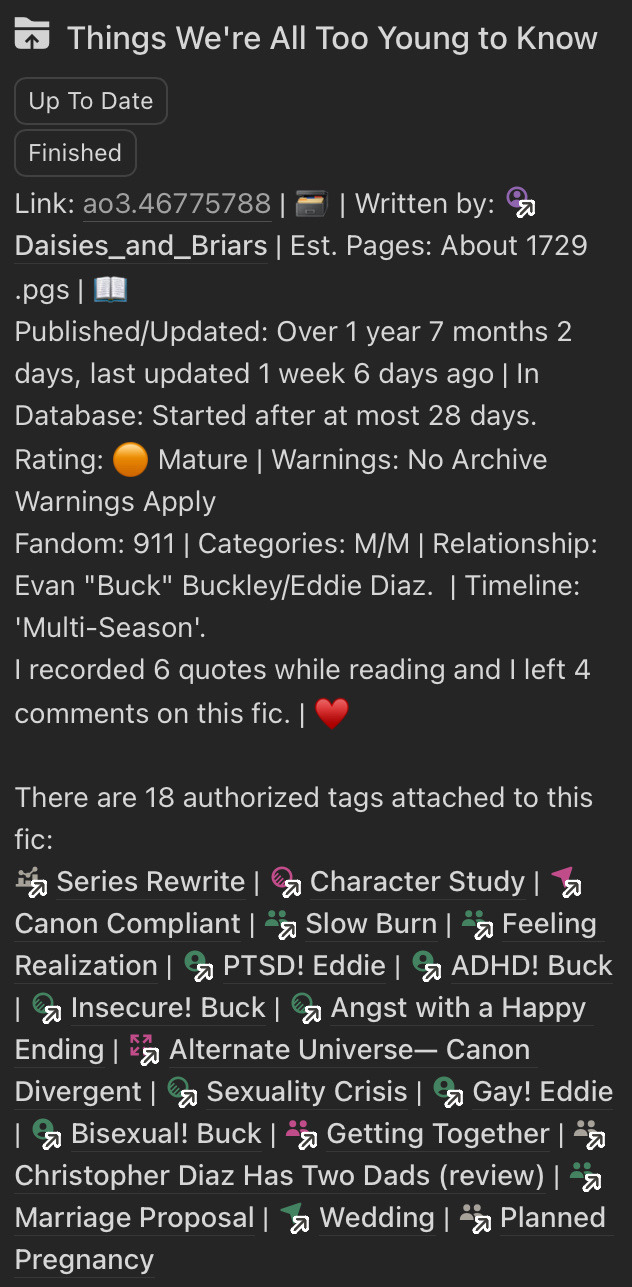
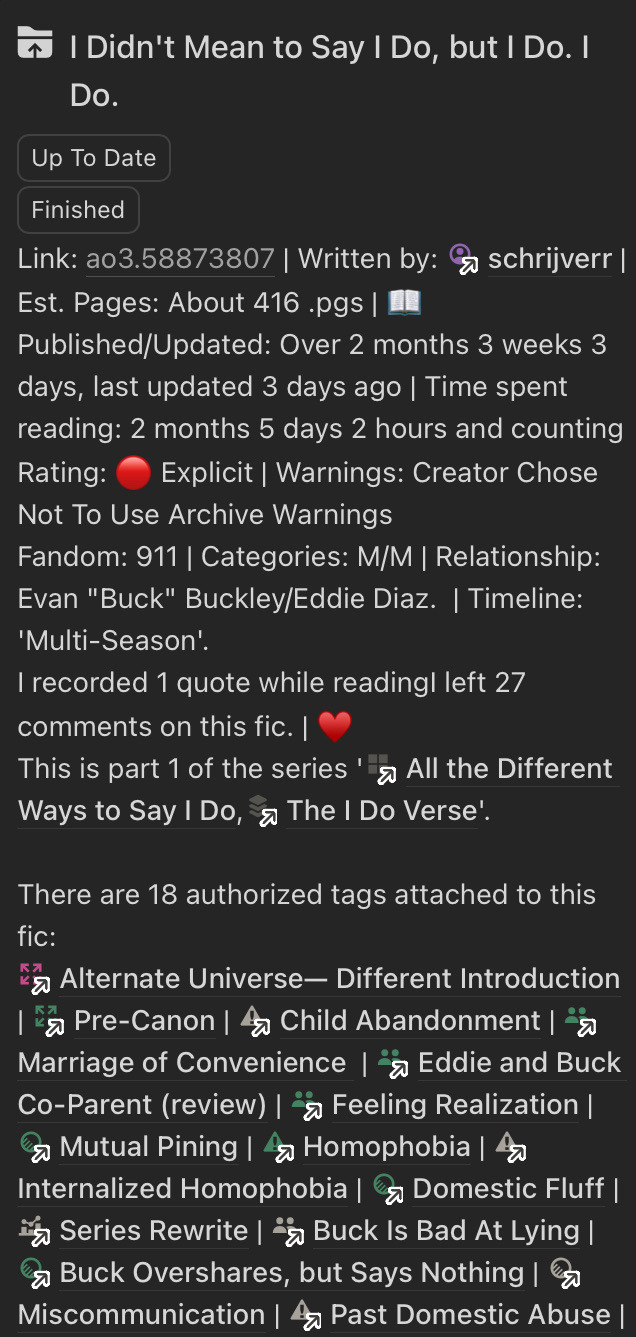
@cal-daisies-and-briars and @schrijverr are both really amazing creators in the fandom BTW so if you haven't read any of either of their work I can genuinely say I recommend all of it!
And I’ll show you one more fic I just finished and highly highly recommend because I was following it and the creator just completed it! @memequeme
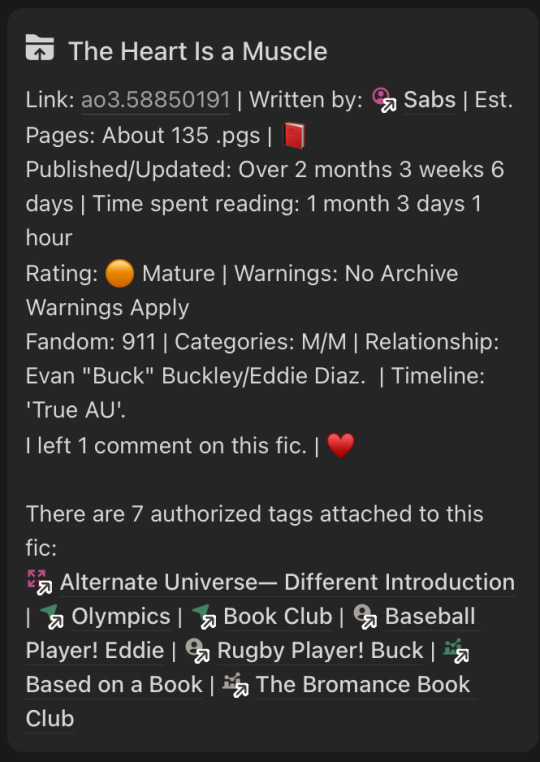
Time for sleep now!
#911 abc#fandom#fanfiction database#ao3#library science#i genuinely dont know#what to tag posts about this database?#notion#????
11 notes
·
View notes